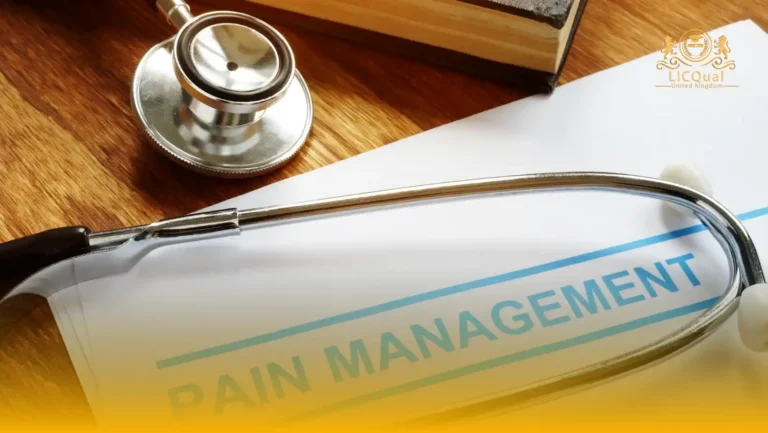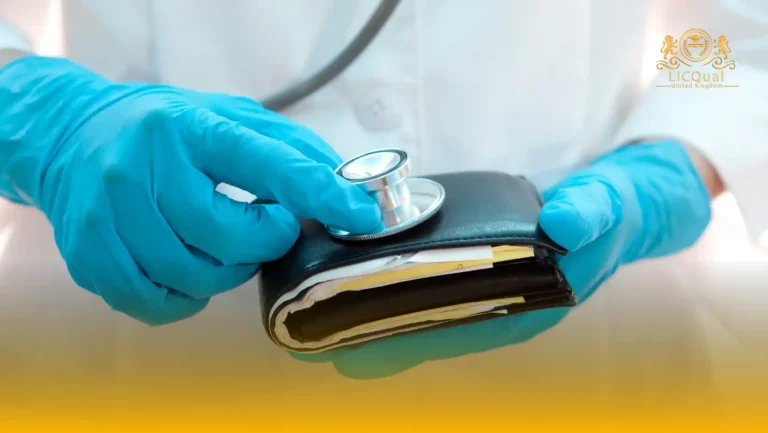The LICQual Level 6 Diploma in Pharmaceutical Regulatory Affairs (D Regulatory Affairs) is a distinguished qualification designed for professionals seeking to advance their careers in the pharmaceutical, biotechnology, and healthcare sectors. This advanced programme provides learners with comprehensive knowledge of regulatory frameworks, compliance requirements, and the processes necessary to bring pharmaceutical products to market safely and efficiently. By completing this diploma, learners enhance their expertise, strengthen their professional credentials, and gain recognized Continuing Professional Development (CPD) recognition.
This Level 6 Diploma is particularly suited to regulatory affairs specialists, quality assurance professionals, clinical trial managers, and those involved in pharmaceutical development, marketing authorisation, or compliance. Learners will develop the skills to interpret complex regulations, ensure product safety and efficacy, and support strategic decision-making within pharmaceutical organisations. The curriculum combines theoretical knowledge with practical application, preparing learners for leadership and specialist roles in regulatory affairs and compliance.
To ensure high-quality learning, centres delivering this qualification must employ competent and qualified staff and provide all necessary learning resources, including access to regulatory databases, industry guidelines, and up-to-date reference materials. Centres are expected to create a supportive learning environment, guiding learners through practical and theoretical components to achieve success.
With a focus on professional development, regulatory excellence, and industry relevance, the LICQual Level 6 Diploma in Pharmaceutical Regulatory Affairs is ideal for learners who wish to elevate their careers, navigate complex regulatory landscapes confidently, and make a meaningful impact within the pharmaceutical and healthcare sectors.
Course Overview
Qualification Title
LICQual Level 6 Diploma in Pharmaceutical Regulatory Affairs (D Regulatory Affairs)
Total Units
6
Total Credits
120
GLH
480
Qualification #
LICQ2201194
Qualification Specification
To enroll in the LICQual Level 6 Diploma in Pharmaceutical Regulatory Affairs (D Regulatory Affairs) , applicants must meet the following criteria:
|
Qualification# |
Unit Title |
Credits |
GLH |
|---|---|---|---|
|
LICQ2201194-1 |
Introduction to Pharmaceutical Regulatory Affairs |
20 |
80 |
|
LICQ2201194-2 |
Medicines Legislation and Compliance |
20 |
80 |
|
LICQ2201194-3 |
Regulatory Documentation and Submission Processes |
20 |
80 |
|
LICQ2201194-4 |
Pharmacovigilance and Risk Management |
20 |
80 |
|
LICQ2201194-5 |
Clinical Trials and Regulatory Strategy |
20 |
80 |
|
LICQ2201194-6 |
Advanced Regulatory Affairs Project |
20 |
80 |
By the end of this course, learners will be able to:
Unit 1: Introduction to Pharmaceutical Regulatory Affairs
By the end of this unit, learners will be able to:
- Explain the role and scope of regulatory affairs in the pharmaceutical industry
- Analyse national and international regulatory frameworks for medicines and healthcare products
- Evaluate the impact of regulations on drug development and market authorisation
- Apply regulatory knowledge to support compliance and strategic decision-making
Unit 2: Medicines Legislation and Compliance
By the end of this unit, learners will be able to:
- Demonstrate understanding of national and international medicines legislation
- Evaluate compliance requirements including GMP, GCP, and other industry standards
- Analyse the legal and ethical responsibilities of pharmaceutical organisations
- Apply legislative knowledge to ensure regulatory compliance in practice
Unit 3: Regulatory Documentation and Submission Processes
By the end of this unit, learners will be able to:
- Prepare and review regulatory dossiers and submission documents accurately
- Analyse requirements for marketing authorisation applications and reporting processes
- Evaluate regulatory submission strategies to ensure approval efficiency
- Apply documentation standards to support compliance and product registration
Unit 4: Pharmacovigilance and Risk Management
By the end of this unit, learners will be able to:
- Explain principles and processes of pharmacovigilance and drug safety monitoring
- Analyse adverse event data and implement risk management strategies
- Evaluate regulatory requirements for safety reporting and mitigation plans
- Apply pharmacovigilance procedures to ensure patient safety and regulatory compliance
Unit 5: Clinical Trials and Regulatory Strategy
By the end of this unit, learners will be able to:
- Demonstrate understanding of clinical trial design and regulatory approval processes
- Analyse protocols for compliance with ethical and legal standards
- Evaluate regulatory strategies for product development and lifecycle management
- Apply regulatory knowledge to support effective clinical trial management
Unit 6: Advanced Regulatory Affairs Project
By the end of this unit, learners will be able to:
- Plan and execute an independent project addressing a real-world regulatory challenge
- Critically review scientific and regulatory literature to inform project outcomes
- Develop practical solutions and strategies for regulatory compliance
- Present findings professionally, demonstrating analytical, decision-making, and reporting skills
The LICQual Level 6 Diploma in Pharmaceutical Regulatory Affairs (D Regulatory Affairs) is designed for professionals and students who want to strengthen their expertise in pharmaceutical compliance, regulatory frameworks, and healthcare law. This internationally accredited qualification is ideal for pharmacists, healthcare managers, policy makers, and researchers who aim to lead in regulatory affairs and ensure safe, ethical, and effective healthcare systems. With flexible online study and global recognition, it is perfect for anyone seeking career advancement, credibility, and practical skills in pharmaceutical regulatory affairs.
1. Practicing Pharmacists
- Gain advanced knowledge of pharmaceutical regulatory affairs and compliance standards
- Strengthen patient safety and adherence to international healthcare regulations
- Enhance credibility with an internationally recognized qualification
- Prepare for leadership roles in hospitals, clinics, and pharmaceutical organizations
- Stay updated with evolving global regulatory frameworks and healthcare policies
2. Pharmacy Students and Graduates
- Build a strong foundation in regulatory affairs before entering the workforce
- Improve employability with a Level 6 diploma UK recognized
- Learn practical applications of pharmaceutical law and compliance management
- Gain confidence in applying regulatory principles in real‑world settings
- Add a career‑ready certification to your academic portfolio
3. Healthcare Professionals
- Understand pharmaceutical regulatory affairs across diverse healthcare systems
- Strengthen skills in patient safety, drug utilization, and compliance monitoring
- Expand career opportunities with international accreditation
- Apply regulatory principles in multidisciplinary healthcare teams
- Improve patient trust through safe and effective medicine delivery
4. Healthcare Managers and Administrators
- Deepen expertise in pharmaceutical regulatory affairs and healthcare systems management
- Strengthen oversight of ethical and professional healthcare practices
- Gain practical tools for monitoring and evaluating healthcare performance
- Improve career advancement opportunities in healthcare administration
- Enhance credibility with a specialized diploma in regulatory affairs
5. Pharmaceutical Researchers
- Gain insights into regulatory requirements for drug development and clinical trials
- Strengthen research credibility with accredited certification
- Learn practical tools for designing and evaluating pharmaceutical studies
- Improve career advancement opportunities in pharmaceutical R&D
- Enhance knowledge of evidence‑based medicine and healthcare informatics
6. Policy Makers and Government Officials
- Understand regulatory affairs for healthcare policy and decision‑making
- Strengthen ability to evaluate compliance of national health programs
- Learn practical tools for resource allocation and healthcare planning
- Improve credibility with a specialized diploma in healthcare regulation
- Contribute to sustainable healthcare systems in developing and developed nations
7. International Candidates
- Earn a globally recognized pharmaceutical regulatory affairs qualification
- Access flexible online study from anywhere in the world
- Meet international accreditation standards for healthcare practice
- Strengthen career prospects in diverse healthcare and pharmaceutical markets
- Gain cross‑border knowledge of regulatory affairs and healthcare systems
To deliver the LICQual Level 6 Diploma in Pharmaceutical Regulatory Affairs (D Regulatory Affairs), centres must meet high standards to ensure learners receive a high-quality learning experience. Centres are expected to:
- Employ competent and qualified staff with relevant academic qualifications and professional experience in regulatory affairs, pharmaceutical sciences, or healthcare compliance.
- Provide access to up-to-date learning resources, including regulatory guidelines, legislation documents, scientific journals, industry databases, and reference materials.
- Maintain suitable facilities, including classrooms, seminar rooms, or online platforms to support both theoretical and practical learning activities.
- Implement robust assessment and feedback processes to monitor learner progress and ensure achievement of learning outcomes.
- Support learners with digital and analytical tools, enabling them to practice regulatory documentation, pharmacovigilance, and compliance simulations.
- Promote a culture of Continuing Professional Development (CPD), encouraging staff and learners to stay updated with regulatory changes, industry best practices, and emerging trends.
- Comply with national and international quality standards, ensuring all teaching, learning, and assessment practices meet recognised industry and educational benchmarks.
By meeting these requirements, centres provide a professional and supportive learning environment, equipping learners with the knowledge, skills, and confidence needed to succeed in pharmaceutical regulatory affairs and advance their careers.
Assessment and Verification
All units within this qualification are subject to internal assessment by the approved centre and external verification by LICQual. The qualification follows a criterion-referenced assessment approach, ensuring that learners meet all specified learning outcomes.
To achieve a ‘Pass’ in any unit, learners must provide valid, sufficient, and authentic evidence demonstrating their attainment of all learning outcomes and compliance with the prescribed assessment criteria. The Assessor is responsible for evaluating the evidence and determining whether the learner has successfully met the required standards.
Assessors must maintain a clear and comprehensive audit trail, documenting the basis for their assessment decisions to ensure transparency, consistency, and compliance with quality assurance requirements.







